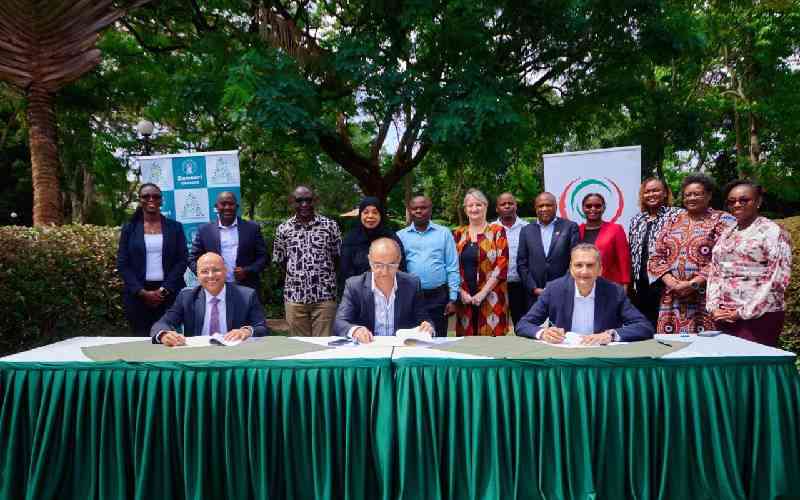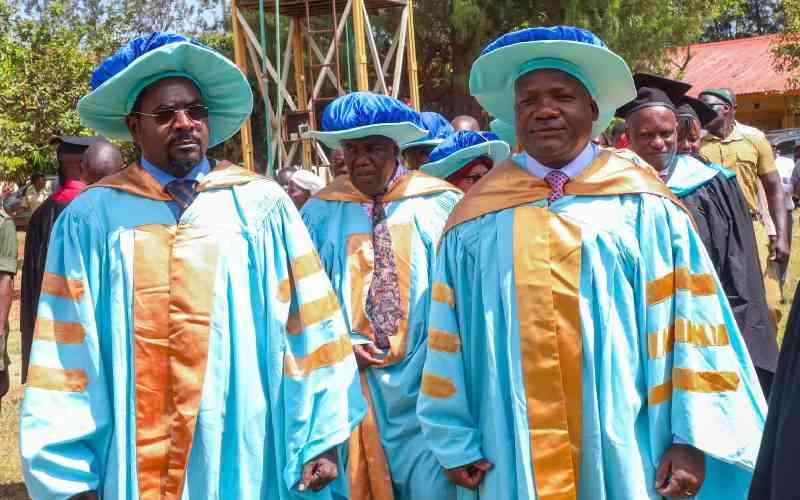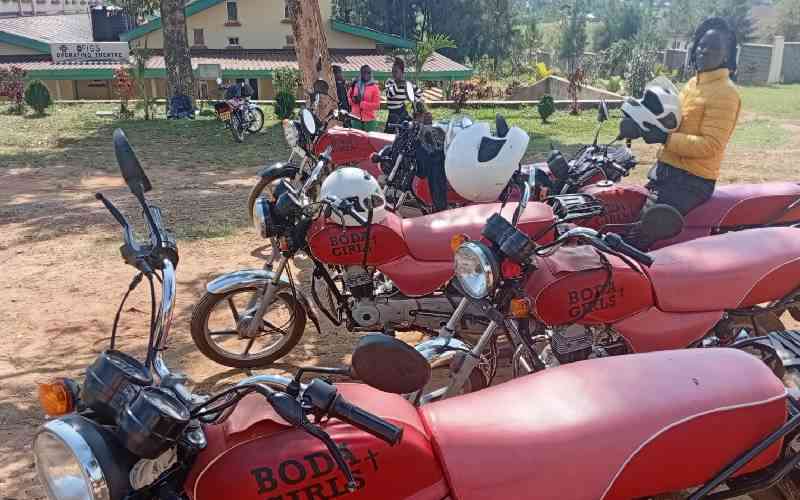 Cabinet Secretary James Macharia receives a report on Genetically Modified Organisms (GMOs) from the chairman of the task force appointed to assess the safety of GMOs, Prof Kihumbu Thairu. [PHOTO: FILE/STANDARD]
Cabinet Secretary James Macharia receives a report on Genetically Modified Organisms (GMOs) from the chairman of the task force appointed to assess the safety of GMOs, Prof Kihumbu Thairu. [PHOTO: FILE/STANDARD]
NAIROBI, KENYA: The genetically altered maize variety that led to the ban of genetically modified organisms (GMO) food imports into the country has been harvested at a research facility in Lower Eastern region.
A crop of the GM maize was harvested two weeks ago at the Kenya Agricultural Research Institute, Kiboko facility, in the ongoing trials to establish the suitability of the crop in Kenya.
The trait called MON810 supplied by the American seed giant Monsanto shot to international limelight in 2012 when a French researcher claimed it had caused cancer in mice.
Scientist Gilles-Eric Seralini from France's Caen University in a study that attracted global attention, claimed that rats fed on the genetically-altered maize developed severe liver and kidney damage as well as hormonal disturbances.
Results also indicated high rates of large cancerous tumours and deaths in most of the study groups.
Based on these findings, former Health Minister Beth Mugo presented her concerns over the safety of GMOs to former President Mwai Kibaki's Cabinet with recommendations that such imports be banned.
The Cabinet ordered a ban, which, however, according to the National Biosafety Agency (NBA), does not affect any materials imported for research purposes such as the one going on at Kiboko.
THIRD TIME
According to one of the senior scientists involved in the project, Dr Stephen Mugo, the MON810 trait contains a gene that makes it insect and drought-tolerant.
The current harvest, he told the media, was the third time they were testing this gene in maize locally. "We were specifically testing its drought-stress tolerance and its resistance to stem borers that cause about 15 per cent maize damage globally and 17 per cent in Kenya."
Mr Mugo says they still have more work to do before they can apply to the NBA to put the seeds in the market. However recent developments puts doubt's on the NBAs capacity to effectively regulate the release of GMOs to the public.
In July, the NBA had wanted Unilever to remove its food seasoning Aromat from the local market after claims that it contained GMO and hence contravened the 2012 ban.
However, just before the judgment was delivered, Unilever withdrew the case last month and explained to the media that the two parties had agreed to settle the matter out of court.
About two weeks ago James Jakachira, a director at Unilever East Africa, told the media they had agreed with NBA to amicably resolve any issues surrounding the product out of court.
But speaking to The Standard, the head of NBA Dr Willy Tonui was far from satisfied with the development.
"We felt short-changed because we would have wanted the issue to go through the whole court process and a judgment made."
He said the agency had received the court bundles on Thursday and were studying them to decide what line of action to take next. "But whatever we decide, top-most will be public safety," Dr Tonui said.
He explained that Unilever had conceded that it will first unload the current stocks on its hands before engaging in plans to bring in non-GMO variants.
Tonui could however not say when current stocks will be exhausted and whether an independent body will carry tests on future stocks.
The handling of the case may justify the findings of the Government team which had been appointed to study the health safety of consuming GMOs. The group's finding have since been passed to the Cabinet.
The Dr Thairu study, as it is known, and whose contents are yet to be made public is understood to recommend that the ban stays because available data and knowledge does not prove that GMOs are not a danger to public health.
The team had also indicated that the country lacked sufficient mechanisms to adequately manage issues of GMOs.
 The Standard Group Plc is a multi-media organization with investments in media
platforms spanning newspaper print
operations, television, radio broadcasting, digital and online services. The
Standard Group is recognized as a
leading multi-media house in Kenya with a key influence in matters of national
and international interest.
The Standard Group Plc is a multi-media organization with investments in media
platforms spanning newspaper print
operations, television, radio broadcasting, digital and online services. The
Standard Group is recognized as a
leading multi-media house in Kenya with a key influence in matters of national
and international interest.











